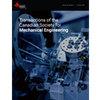Rolling bearing fault diagnosis based on DRS frequency spectrum image and improved DQN
IF 0.8
4区 工程技术
Q4 ENGINEERING, MECHANICAL
Transactions of The Canadian Society for Mechanical Engineering
Pub Date : 2024-06-04
DOI:10.1139/tcsme-2024-0020
引用次数: 0
Abstract
Deep learning may encounter challenges in fault diagnosis, such as exploration capability, long-term planning, and handling non-deterministic factors. The paper introduces a novel fault diagnosis method for rolling bearings combining deep Q-network (DQN) with discrete random separation (DRS) frequency spectrum images. DRS can be used to separate the deterministic components and random components of the fault signal and extract the fault feature very effectively. The improved DQN incorporates the atrous spatial pyramid pooling module for multiscale contextual fault feature extraction, enhancing diagnosis accuracy. Various deep networks, including convolutional neural network, ResNet18, traditional DQN, and the improved DQN, are employed with different frequency spectrum images (power spectral density, cepstrum, and DRS) for diagnosing bearing faults. Simulation results demonstrate that combining DRS frequency spectrum images with the improved DQN enhances fault diagnosis accuracy across diverse conditions. Generalization tests reveal strong capability of the proposed method in handling conditions different from the training data. Validation tests on difficult-to-diagnose fault data from the CWRU-bearing dataset demonstrate commendable performance of the improved DQN, even on difficult datasets. Finally, validation tests using the XJTU–SY bearing dataset reaffirm the excellent performance and robust adaptability of the improved DQN in conjunction with DRS frequency spectrum images.基于 DRS 频谱图像和改进 DQN 的滚动轴承故障诊断
深度学习在故障诊断中可能会遇到一些挑战,如探索能力、长期规划和处理非确定性因素等。本文介绍了一种结合深度 Q 网络(DQN)和离散随机分离(DRS)频谱图像的新型滚动轴承故障诊断方法。DRS 可用于分离故障信号中的确定分量和随机分量,并能非常有效地提取故障特征。改进后的 DQN 加入了无规空间金字塔池化模块,用于多尺度上下文故障特征提取,提高了诊断准确性。各种深度网络(包括卷积神经网络、ResNet18、传统 DQN 和改进 DQN)与不同的频谱图像(功率谱密度、倒频谱和 DRS)配合使用,用于诊断轴承故障。仿真结果表明,将 DRS 频谱图像与改进型 DQN 相结合,可提高不同条件下的故障诊断准确性。泛化测试显示,所提出的方法在处理与训练数据不同的条件时具有很强的能力。对 CWRU 轴承数据集中难以诊断的故障数据进行的验证测试表明,即使在困难的数据集上,改进后的 DQN 的性能也值得称赞。最后,使用 XJTU-SY 轴承数据集进行的验证测试再次证明了改进型 DQN 结合 DRS 频谱图像的卓越性能和强大的适应性。
本文章由计算机程序翻译,如有差异,请以英文原文为准。
求助全文
约1分钟内获得全文
求助全文
来源期刊
CiteScore
2.30
自引率
0.00%
发文量
53
审稿时长
5 months
期刊介绍:
Published since 1972, Transactions of the Canadian Society for Mechanical Engineering is a quarterly journal that publishes comprehensive research articles and notes in the broad field of mechanical engineering. New advances in energy systems, biomechanics, engineering analysis and design, environmental engineering, materials technology, advanced manufacturing, mechatronics, MEMS, nanotechnology, thermo-fluids engineering, and transportation systems are featured.

 求助内容:
求助内容: 应助结果提醒方式:
应助结果提醒方式:


